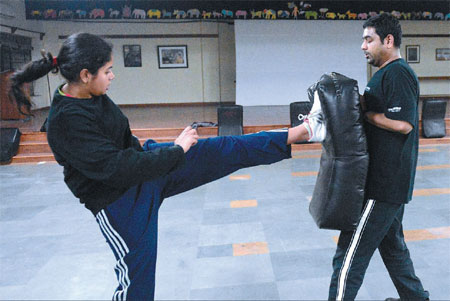Pepper spray, alarms flying off store shelves.
After nearly three weeks of lurid reporting on a horrifying gang rape in New Delhi, women in the Indian capital say they are more anxious than ever, leading to a surge in interest in self-defense classes.
New Delhi has long been known as the "rape capital of India", with more than twice as many cases in 2011 as the commercial hub Mumbai, and special care is taken by most women when traveling at night or on public transportation.
|
 |
|
A woman spars with a trainer during a self-defense class in New Delhi, where the gang rape of a woman in December has many women worrying about their safety. Raveendran / AFP |
Self-defense trainer Anuj Sharma said he has fielded a flurry of calls from concerned women interested in taking classes at his training institute in south New Delhi.
"There has been a certain surge in the level of demand for services like self-defense and personal protective training," Sharma said at a class in a school hall, echoing comments from other martial-arts experts in the city.
"I think this infamous case has forced people to think that they can no longer put this (safety issue) on the back burner, self-defense is a priority for them," he said.
Smriti Iyer, a 23-year-old student, said she started coming to Sharma's classes to improve her self-defense ability.
In the classes, Sharma teaches her basic self-defense, including how to squirm free from the grip of an attacker and disable them with a punch or kick to the groin.
"I think women have always known that they have to look after themselves, but after this incident, a lot of people of my age have really started taking this up," said Iyer.
Across the sprawling city of 16 million, shopkeepers say sales of pepper spray and rape alarms are up, while many young women report that relatives have become more concerned than ever about their welfare.
One newspaper reported this week that women had started coming forward to apply for gun licenses.
Jai Shankar, owner of a general store on the Janpath main road in central New Delhi, said that sales of pepper spray had been "brisk" since the gang rape, which has galvanized disgust over rising crime against women.
"Earlier we would sell just a few cans in a month. But more women have been coming to my shop asking for the spray," he said.
Ashima Sagar, a 22-year-old sales assistant at Shankar's shop, says her mother has become almost paranoid, even though Sagar takes the "relatively safer" metro train with reserved carriages for women at night.
"I leave my workplace around nine at night. After this incident, even if I am late by 10 minutes, my mother gets anxious and calls me to find out if I am OK," she said.
In the outsourcing industry, rocked by a rape and murder of an employee late at night in 2005, some companies have begun providing extra security to female employees who work late shifts.
"After the New Delhi incident, we ensure that at least one security guard is present in our late-night cabs," said Anurag Mathur, a human resources executive of a New Delhi-based company.
A survey published on Friday by industry group ASSOCHAM showed a 40 percent fall in the productivity of women employees at call centers and IT companies because many had reduced their hours or had quit.
As anxiety takes root, in which many cases women simply stay at home more, activists have raised their voices to condemn the government for failing to offer protection.
"Why should we live in a society where every woman is made responsible for her own security and safety? What we need really is a system which will protect us," said Ranjana Kumari of the New Delhi-based Center for Social Research.
This has been the source of sometimes-violent protests against the government over the last two and a half weeks as incensed women led marches and demonstrations in cities across the country.
However, statistics show that any self-defense techniques are most likely to be needed against a family member or neighbor, with more than 95 percent of alleged perpetrators in rape cases being someone known to the victim.
There were 24,206 cases of rape registered in 2011 in India, according to the National Crime Records Bureau, but this is thought to be gross under-representation of the problem.
In the cities, 17 percent of cases were recorded in New Delhi, compared with 8.6 percent for Mumbai.